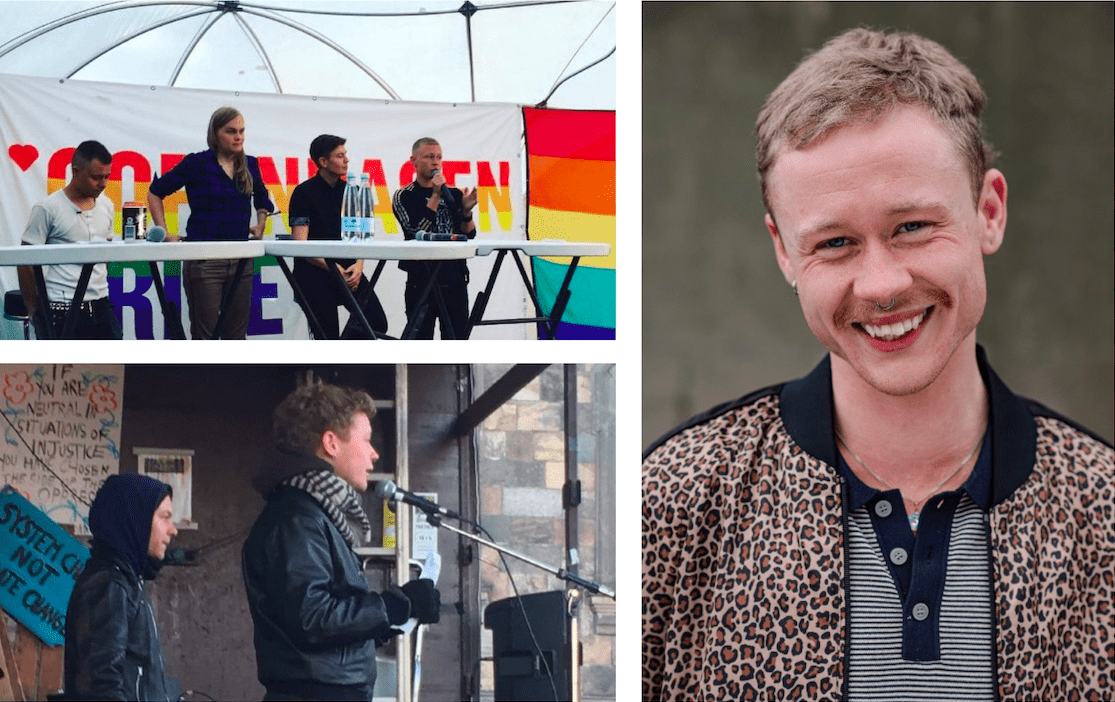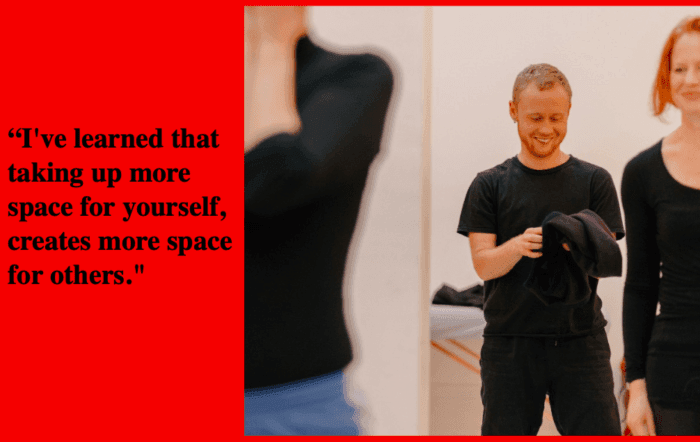
Axel Nielsen, Pantarei Approach Practitioner
Breaking Down Boxes
From a background in activism for transgender rights and social justice, Axel Nielsen now changes society by working through the personal. Axel eloquently explains how his own process in the Pantarei training program led to important discoveries about what uniqueness can mean and offer for transgender and non-binary clients.
You just finished the Pantarei Approach training program. How was it for you?
The training was a way for me to change my focus on making change in the world. I had been a purely structural, political ‘heady’ person for a long time, and I had burned out because of it. I wanted some kind of body perspective and I knew it would be a challenge for me. When I started the training, I think it really hit me how disconnected I was and how much in defense I was to other people in general. I found it intimidating with all of the trust and touching. But at the same time, it felt important so I kept connecting to the reasons I started the training. I wanted to learn to be in my own body, and I wanted to teach other trans and queer people to be in their bodies. I was hoping all of the resistance I was meeting was at some point going to change and become something better. In the end, I enjoyed it so much. I learned a lot.
The first day we were lying down on the floor. Claudia, the co-founder, said the sentence ‘Notice how you are safe here’ and I felt my body sweating and shaking a little bit. I was responding with a longing to be safe and recognized that is not what I was feeling. It was a really important turning point for me. I decided I want to learn to feel safe in the world. I could not hide anymore that I didn’t feel safe.
What did you learn from this moment?
It is not easy coming back to your body if you had been distanced from it for so long. I mostly work with other trans and queer people. For us (and many others), I see a real special connection between uniqueness and violence. Many of us have grown up, myself included, learning that to show my uniqueness, my gender identity, and my sexuality often came either hand in hand with facing violence or the fear of violence. When you are asked to show your uniqueness, for me it comes with a bit of a fear response that I recognize in many of my clients as well. It can be dangerous because it has been violent in the past. When I say, I mean everything from being bullied in school to being harassed and attacked on the street— to living without basic human rights like access to health care.
SEARCHING FOR SAFETY
How do you work then with uniqueness with your clients?
I see how the Pantarei Approach is so useful for the trans and non-binary clients I work with because we all crave to show our uniqueness and live more authentically. With the work I offer, I want to honor and recognize that it is important to negotiate when do I show my uniqueness in the more mainstream world because it can, unfortunately, mean that they will get harassed and attacked. There is a very good reason why most cis-men don’t walk around in dresses on the street. There is a reason why trans and non-binary people are insecure about showing their bodies at the beach. When you break the norms around gender and sexuality, we, unfortunately, live in a world where that can be dangerous and there is a real threat of violence.
I want to support my clients in deciding when they want to show their uniqueness and when they need to protect and take care of themselves. And there is such important work on how to transition from being in my self-protective state to letting my guard down and recognizing now I’m in a safe space. I think the Pantarei Approach with touch has been really beneficial to say ‘here is safety,’ and it can support people to recognize when safety is present. Because many of us have spent more time searching for when it is not safe.
What do you aim to do as a practitioner?
My driving force is community. Community completely saved my life. Coming into a queer community, activist community—there is something about being welcomed and recognized by a group. You are not the weird one, but the majority. It is a very important experience if you have grown up marginalized. But I recognize people come to queer communities with a lot of hurt, growing up in a world that does not really want us to exist. People come with hurt. This can be a problem from the inside if the group does not know how to process their emotions. And I think learning how to process your emotions is a huge gift to our community— the queer ones I am a part of would really benefit from it.
Are these the same goals you had with the activism work?
That’s a good question. In many ways, I was always working with the body as a topic. I was working mainly in Denmark when a law changed, and the trans population lost access to healthcare. This also means losing access to hormones, which many of us depend on to live in bodies that feel like home. So we had about 3 or 4 years of full-on power mode. We were working with the body. What is a healthy body? What do we need to survive? It was more from this level of we don’t have basic human rights down. We need those before we can start working on the next level.
So much has happened in the last 5 and 10 years. The very basic human rights are there now — at least in some parts of the world. That does not mean we still don’t face violence in many places. But even though there is still a long way to go, the rights and laws are rather secure. So, I think there is space to start on something else now. And that is what Pantarei is for me.
KNOWING WHO YOU ARE
How is a somatic bodywork session important for a transgender or non-binary person?
The Pantaeri Approach highlights that when facing challenges, we also build our resilience and strength. And oh my God — the amount of self-love transgender and non-binary people need to find in themselves, just to exist — I wish I could show to the world. The trans and non-binary clients I have really know who they are because they have had to develop that sense of inner knowledge mostly in an environment that did not support it. If they were lucky, the environment was accepting. But the right support and mirroring was most often not there. Therefore, there has been such a large amount of resources built. And what I see is when just a small amount of recognition or positive allowance is offered, it is like an explosion of power sometimes. They just needed support to unleash it.
A transgender or non-binary person knows who they are. Maybe they have doubts about which pronoun they want to use that fits them or want to have this surgery, but that is their feeling into how they want to present themselves. But the core of knowing who they are is very stable. The trouble often comes when that core needs to be translated into a language built around two genders and not the reality — that there are as many genders as there are people.
What is your favorite aspect of the Pantarei Approach?
To insist on looking for people’s strengths and resources. I know those conversations where you just spiral into a downward hole because you are bringing up all of the conflicts and troubles and challenges. My trans and non-binary clients have a lot of things they could complain about. There are a lot of privileges we lack, and that affect our everyday life. We can lose ourselves in all the things that are wrong. I know how that road ends. We can get sad about it or we can try to recognize it and focus on what strength we have developed to deal with that challenge. And I find that so rewarding for myself. When I was doing activism, I left meetings feeling more down about the world. But when working with clients, I leave sessions feeling more hopeful about the world.
A final thought?
I think uniqueness is important for people to get in touch with because when people allow themselves to stay unique, even despite a world that may not be a fan of it, it is really a gift to the world. People breaking down boxes of gender is giving everyone more space. When I see someone embodying a non-binary identity unapologetically, embodying trans-joy or even experiencing gender-euphoria, I see someone showing the way for a lot of self-love. They show that rigid boxes can be broken. Breaking boxes is necessary to be happy and keep the world moving forward to a better place. When you support people in that process, you create more space in the world.
I’ve learned that taking up more space for yourself, creates more space for others. I see when trans, non-binary and queer people in general take up more space, it sometimes triggers people who have a lot of hurt about their own sexuality or gender identity, or what they did not allow themselves because of societal restrictions. I want people to realize there is something they have not been able to express themselves because of their struggles around gender. A grounded and joyful queer person is an act of resilience in itself. People embodying a trans and non-binary identity with confidence, create so many ripples in the borders around them because it shows people what is possible. Breaking down boxes is healthy.
Get in touch with Axel:

Written by Mike O’Connor





